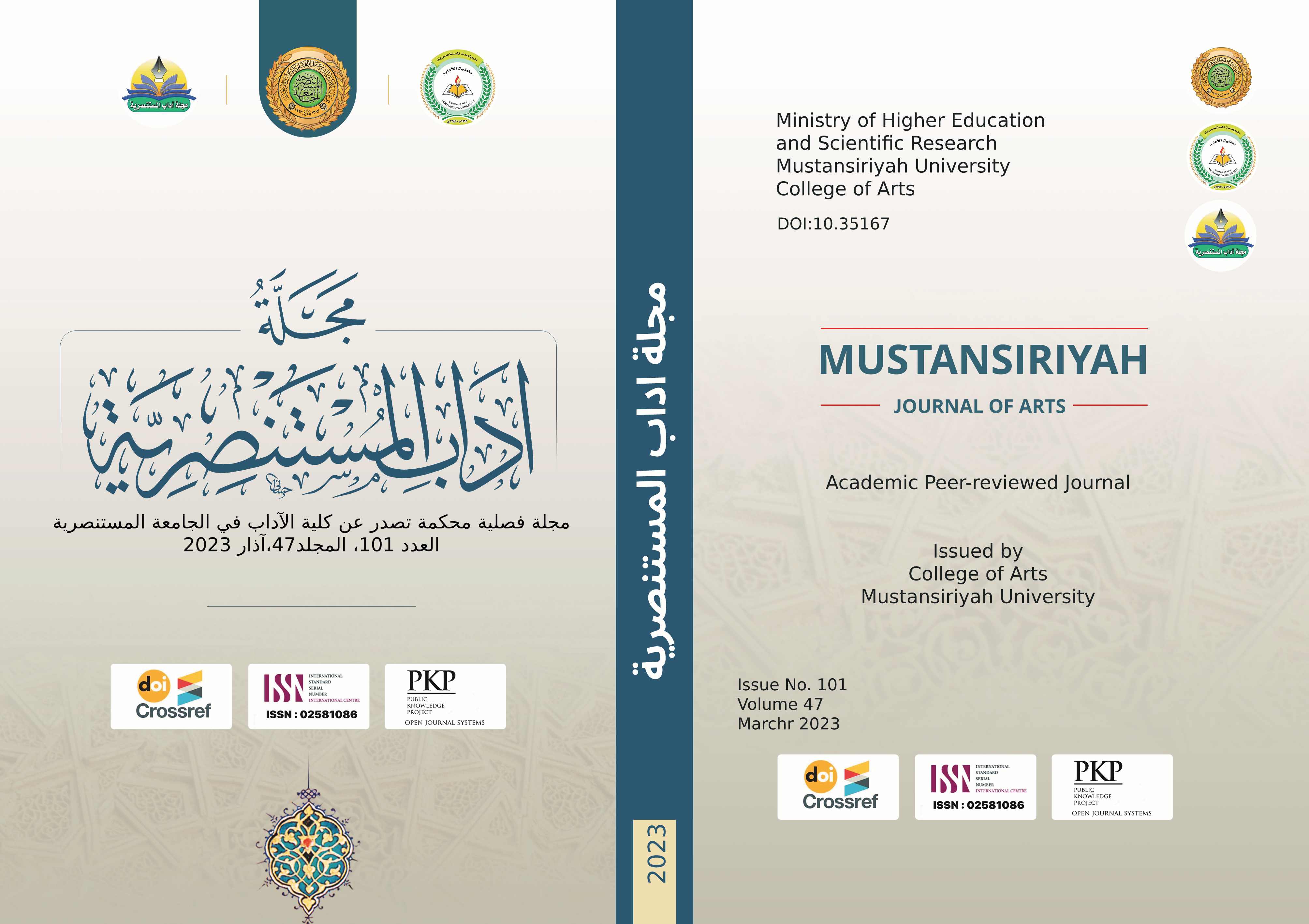The Arab Renaissance and Consciousness of Paradox
Keywords:
Arab Renaissance, Enlightenment, Paradox, Identity, Modernity, Progress, Arab Thought, Religious Reform, Heritage, Secularism, the stateAbstract
The European newcomer posed a challenge to the renaissance intellectuals' view of the world and the place of Muslims in it. The results of this challenge were full of contradictions, as the newcomer seemed attractive, suspicious, and repulsive simultaneously, inevitable and accidental. He blew up their accumulated self-obsessions about their identity. He also aroused in them a direct intuition of their identity that reflects their excessive sensitivity in interacting with this alien newcomer. Since then, Arab thought has been preoccupied with questioning the self-identity against the Other. It also questioned why the Other is the most advanced, powerful and dominant? This challenge has imposed on the consciousness an immediate cognitive response. It was not primarily the result of developing the subjective laws of Arab societies. However, it came mainly due to an abrupt external factor, which came from outside Arab societies and provoked their stable and stagnant structure. Thus, the Arab Renaissance was formed as a broad ideological stream. It produced different and paradoxical intellectual responses dominated by reverberation. The dilemma of historical perception of the Arab Renaissance still dominates a wide area of the prevalent intellectual and cultural debate nowadays. There is a continuous argument about the Arab Renaissance as a necessary means for salvation. The excessive discussion on the potential of the second or third Arab Renaissance, at a minimum, is an acknowledgement of the failure of the first one. This also means that the first one was not originally a renaissance and did not constitute a historical renaissance case. In this context, the historical question arises in the ruins of this debate, albeit extreme: Was there an Arab renaissance? What makes us say it has existed? How can we measure it? Did the theoretical and historical event since the late eighteenth century and during a century constitute a renaissance act? How can we investigate the reasons for its failure and setback? If the last question is legitimate and justified, is it correct to distinguish between the intellectual and theoretical success of the Renaissance and the historical success? Is it possible to distinguish between the failure of the two levels as well? Is it permissible to separate them? Why was it a renaissance, and compared to what? Was the European Renaissance the ideal paradigm for the latter and its pioneers? Was the European Renaissance reviewed from a historical and critical Arab perspective? Did the Arab renaissance intellectuals achieve any real progress on the issues they faced in their answers and perceptions? Is it right today to read this renaissance event in the light of the European model? Did the latter represent a template for the identification of the historical subject? Did the latter exhaust the historical and epistemological conditions of the European Renaissance, or was it merely a faint shadow of the first and authentic experience?
References
أبو حمدان، سمير. ( ١٩٩٢)، فرح أنطون: صعود الخطاب العلماني العالمية للكتاب، دار الكتاب العربي، بيروت.
أرسلان، شكيب. (٢٠١٧)، لماذا تأخر المسلمون؟ ولماذا تقدّم غيرهم؟ مؤسسة هنداوي، ويندسورـ المملكة المتحدة.
أركون، محمد. ( ١٩٨٢)، الفكر العربي، ترجمة عادل العوا، منشورات عويدات، بيروت.
إسحاق، أديب. ( ١٩٠٩)، الدرر: منتخبات الطيب الذكر الخالد، جمعها عوني اسحاق، المطبعة الأدبية، بيروت.
العالم، محمود أمين. ( ٢٠٠٣)، الفكر العربي بين الخصوصية والكونية، دار المستقبل العربي، القاهرة.
التونسي، خيرالدين. ( ٢٠١٢)، أقوم المسالك في معرفة أحوال الممالك، تقديم محمد الحداد، دار الكتاب المصري- القاهرة، دار الكتاب اللبناني- بيروت.
الجابري، محمد عابد. (١٩٩٠)، إشكاليات الفكر العربي المعاصر، مركز دراسات الوحدة العربية، بيروت.
الجابري، محمد عابد. ( ١٩٩٤)، الخطاب العربي المعاصر: دراسة تحليلية نقدية، مركز دراسات الوحدة العربية، بيروت.
الجابري، محمد عابد. (٢٠٠٠)، المشروع النهضوي العربي، مركز دراسات الوحدة العربية، بيروت.
العروي، عبدالله. ( ١٩٩٥)، الأيديولوجيا العربية المعاصرة، المركز الثقافي العربي، الدار البيضاء- بيروت.
المغربي، عبد القادر. (١٩٨٧)، جمال الدين الأفغاني، ط٣، دار المعارف، القاهرة.
الطهطاوي، رفاعة رافع. ( ٢٠١٠)، المرشد الأمين للبنات والبنين، الأعمال الكاملة، ج٢، دراسة وتحقيق محمد عمارة، دار الشروق، القاهرة.
الطهطاوي، رفاعة رافع. ( ٢٠١٢)، تخليص الإبريز في تلخيص باريز، مؤسسة هنداوي، وندسور، المملكة المتحدة.
الطهطاوي، رفاعة رافع. ( ٢٠١٨)، مناهج الألباب المصرية في مباهج الآداب العصرية، مؤسسة هنداوي، وندسور، المملكة المتحدة.
الكواكبي، عبد الرحمن. ( ٢٠٠٩)، طبائع الاستبداد ومصارع الاستعباد، الأعمال الكاملة، دراسة وتحقيق محمد عمارة، دار الشروق، القاهرة.
إمام، عبد الفتاح إمام. (١٩٩٤)، الطاغية، سلسلة عالم المعرفة، العدد ١٨٣، المجلس الوطني للثقافة والفنون والآدابـ الكويت.
أنطون، فرح. ( ١٩٨٨)، ابن رشد وفلسفته مع نصوص المناظرات، تقديم طيب تيزيني، دار الفارابي، بيروت.
برينتون، كرين. (١٩٨٤)، تشكيل العقل الحديث، ترجمة شوقي جلال، سلسلة عالم المعرفة (٨٢)، المجلس الوطني للثقافة والفنون والآداب، الكويت.
حوراني، البرت. ( ١٩٦٨)، الفكر العربي في عصر النهضة ١٧٩٨- ١٩٣٩، تر: كريم عزقول، دار النهار، بيروت ١٩٦٨
حنفي، حسن. ( ١٩٨١)، في فكرنا المعاصر، دار التنوير، الطبعة ١، بيروت ١٩٨١
حداد، محمد. ( ٢٠٠٣)، محمد عبده: قراءة جديدة في خطاب الإصلاح الديني، دار الطليعة بيروت.
داية، جان. ( ١٩٨٨)، الإمام الكواكبي، فصل الدين عن الدولة، دار سوراقيا، لندن.
عبدالرازق، علي. ( ٢٠٠٠)، الإسلام وأصول الحكم، دراسة وتوثيق محمد عمارة، المؤسسة العربية للدراسات والنشر، بيروت.
عبده، محمد. ( ٢٠١٢)، الإسلام بين العلم المدنية، مؤسسة الهنداوي للتعليم والثقافة، القاهرة.
عبداللطيف، كمال. ( ١٩٨٧)، التأويل والمفارقة: نحو تأصيل فلسفي للنظر السياسي العربي، المركز الثقافي العربي، بيروت- الدار البيضاء.
عبداللطيف، كمال. ( ١٩٩٢)، قراءات في الفلسفة العربية المعاصرة، دار الطليعة، بيروت.
القاضي، أحمد عرفات وآخرون. (٢٠٠٩)، فلسفة الحرية: أعمال الندوة الفلسفية السابعة عشرة، جامعة القاهرة، مركز دراسات الوحدة العربية، بيروت.
موسى، سلامة. ( ٢٠١٢)، ماهي النهضة؟ ، مؤسسة هنداوي، ويندسور- المملكة المتحدة.

Downloads
Published
Issue
Section
License

This work is licensed under a Creative Commons Attribution-ShareAlike 4.0 International License.

